Our By the Numbers blog series takes a closer look at the numbers, facts, data, and outputs that impact workplace drug testing programs. In this post, we examine the environmental impact of moving from paper-based custody and control forms (CCF) to electronic custody and control forms (eCCF).
Paper-based CCFs have been a mainstay of the drug testing industry since its inception in the 1980s, when the Reagan Administration passed the Drug-Free Workplace Act of 1988. According to the Society for Human Resource Management (SHRM), “the Drug-Free Workplace Act of 1988 requires some federal contractors and all federal grantees to agree that they will provide drug-free workplaces as a condition of receiving a contract or grant from a federal agency.” In 2016, Quest Diagnostics processed more than 11 million workplace drug tests. Moreover, on average, we supply our employer clients with 1.5 paper forms for each drug test conducted. And while a single 5-part paper form may not seem like much, 16.5 million such forms add up—and the environmental impact is dramatic. If eCCFs were used for every Quest Diagnostics drug test performed instead of paper CCFs, 10,000 trees could have been saved in 2016 alone. Expanding the calculation to the entire drug testing industry, an estimated 42,000+ trees could potentially be saved each year.
Quest Diagnostics has been investing in and providing eCCF (formerly known as eReq) to non-regulated employers for nearly a decade, and we launched eCCF for regulated, U.S. Department of Transportation (DOT) drug tests this January. eCCF is currently available for DOT urine, non-DOT urine, Express Results™ Online, oral fluid, and hair drug tests from Quest Diagnostics.
For more information on drug testing, visit our website.
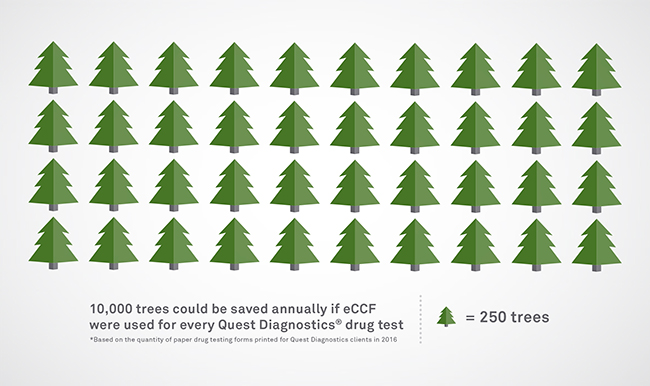
 Your Privacy Choices
|
Privacy Notices
|
Terms
|
Language Assistance / Non-Discrimination Notice | Asistencia de Idiomas / Aviso de no Discriminación | 語言協助 / 不䈚視通知
Your Privacy Choices
|
Privacy Notices
|
Terms
|
Language Assistance / Non-Discrimination Notice | Asistencia de Idiomas / Aviso de no Discriminación | 語言協助 / 不䈚視通知



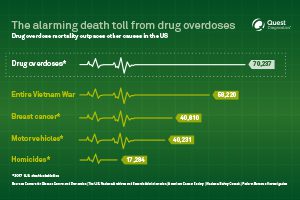







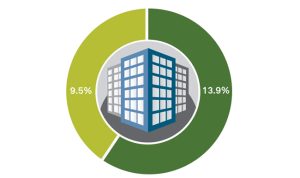

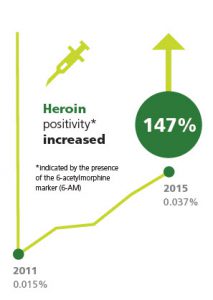
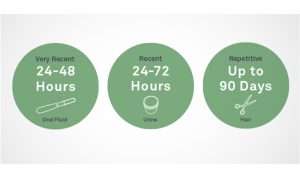




Our By the Numbers blog series takes a closer look at the numbers, facts, data, and outputs that impact workplace drug testing programs. In this post, we examine the environmental impact of moving from paper-based custody and control forms (CCF) to electronic custody and control forms (eCCF).
Paper-based CCFs have been a mainstay of the drug testing industry since its inception in the 1980s, when the Reagan Administration passed the Drug-Free Workplace Act of 1988. According to the Society for Human Resource Management (SHRM), “the Drug-Free Workplace Act of 1988 requires some federal contractors and all federal grantees to agree that they will provide drug-free workplaces as a condition of receiving a contract or grant from a federal agency.” In 2016, Quest Diagnostics processed more than 11 million workplace drug tests. Moreover, on average, we supply our employer clients with 1.5 paper forms for each drug test conducted. And while a single 5-part paper form may not seem like much, 16.5 million such forms add up—and the environmental impact is dramatic. If eCCFs were used for every Quest Diagnostics drug test performed instead of paper CCFs, 10,000 trees could have been saved in 2016 alone. Expanding the calculation to the entire drug testing industry, an estimated 42,000+ trees could potentially be saved each year.
Quest Diagnostics has been investing in and providing eCCF (formerly known as eReq) to non-regulated employers for nearly a decade, and we launched eCCF for regulated, U.S. Department of Transportation (DOT) drug tests this January. eCCF is currently available for DOT urine, non-DOT urine, Express Results™ Online, oral fluid, and hair drug tests from Quest Diagnostics.
For more information on drug testing, visit our website.